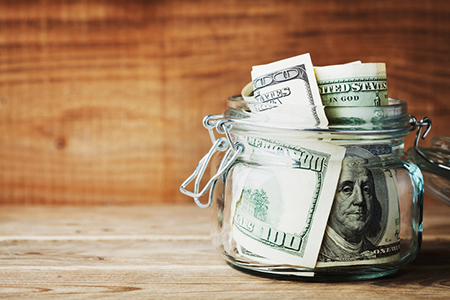9 Ways to Save for a Down Payment
By Kay Bell

You’ve found the perfect house. Interest rates are still low. There’s just one thing standing between you and your dream home: a down payment.
Don’t abandon your homeownership dreams just yet. Here are nine ways to come up with the cash for your new home.
Pay Off Your Credit Cards
Paying bills will help in your hunt for down payment money. When you carry a credit card balance, the ever-accumulating interest charges mean more of your money goes to the card company each month. Keep that cash for yourself by cutting your debt load.
With the “avalanche” method, you prioritize your debts and pay the most on the one with the highest interest rate. Once that’s paid, shift your focus to the next highest rate and so on. You’ll get the most money-sucking credit card bills out of the way more quickly, freeing up more of your income to go toward building your savings.
Ladder CDs to Boost Savings
Once you have a few extra bucks, put it to work making more money for you. Certificates of deposit are low-risk and relatively accessible. But when interest rates are low, the return isn’t always what a saver hopes. You can maximize the earning power of CDs by opening different certificates at varying maturity dates.
For example, instead of buying one big CD, spread your money into three-month, six-month and one-year certificates. Known as laddering, this gives you flexibility to adjust your savings as rates change. Laddering allows you to lock in when rates are high and when rates are not so good. The process keeps you from being stuck for too long with low earnings.
Use Special Programs
There are many programs for homebuyers struggling to save for a down payment, especially for first-time homebuyers. Borrowers in a wide range of incomes, locales and professional groups may have access to aid from Fannie Mae and Freddie Mac, the government-sponsored offices that buy mortgages and package them as investments. Various nonprofit and community groups also lend a hand to buyers struggling to put money down on a home. And don’t forget about assistance from state agencies.
Tap Your IRA
If you’re looking to buy your first home, let the IRS help. Tax laws allow you to use up to $10,000 in IRA funds as a down payment if you’ve never owned a house. If you’re married and you both are first-time buyers, you each can pull from your retirement accounts, meaning a potential $20,000 down payment.
Even better is the IRS definition of “first-time homebuyer.” Technically, you don’t have to be purchasing your very first home. You qualify under the tax rules as long as you (or your spouse) did not own a principal residence at any time during the two years prior to the purchase of the new home. In these instances, Uncle Sam waives the penalty for early withdrawal, but you may owe tax on the money, depending on the type of IRA.
Get a Gift
Aunt Edna always liked you best. Take advantage of that favored family status and ask her to make a present of your down payment. Tax law allows gifts of several thousand dollars a year to be bestowed without tax consequences to either the giver or recipient. The gift-exclusion amount is $14,000 for 2017 and is adjusted annually for inflation.
The gift exclusion isn’t limited to relatives. The monetary present can be from anyone, so track down a well-off friend now.
Ask for a Raise
No luck finding a benefactor? Then maybe it’s time to ask your boss for more money. Just make sure you do your homework beforehand and base your request for a salary increase on your accomplishments rather than your needs.
Get a Second Job
Boss turned down your request for a raise? Moonlighting could help you earn the extra money. This option makes the most sense for those who are young and not yet fully established in their professional lives.
Look for Lost Money
Do you have any money stashed somewhere? Around $23.5 billion worth of matured savings bonds remains unredeemed, according to the Treasury Department, ignored by owners and not earning a penny of interest. Make sure your bonds and other investments are still adding to your net worth.
You could also have money languishing in an old bank account somewhere. You can file a claim with the Treasury to claim lost, stolen or destroyed savings bonds, or check the National Association of Unclaimed Property Administrators to see if you have any missing money.
Sell Unwanted Items
You likely have some used furniture you no longer use or old clothes that are no longer in style. Sell it to make a few more bucks to use for your down payment.
You can sell your items on sites like Craigslist, eBay, Facebook and Amazon to turn your trash into someone else’s treasure.
©2017 Bankrate.com
Share This Post
| Previous Post | Next Post |
